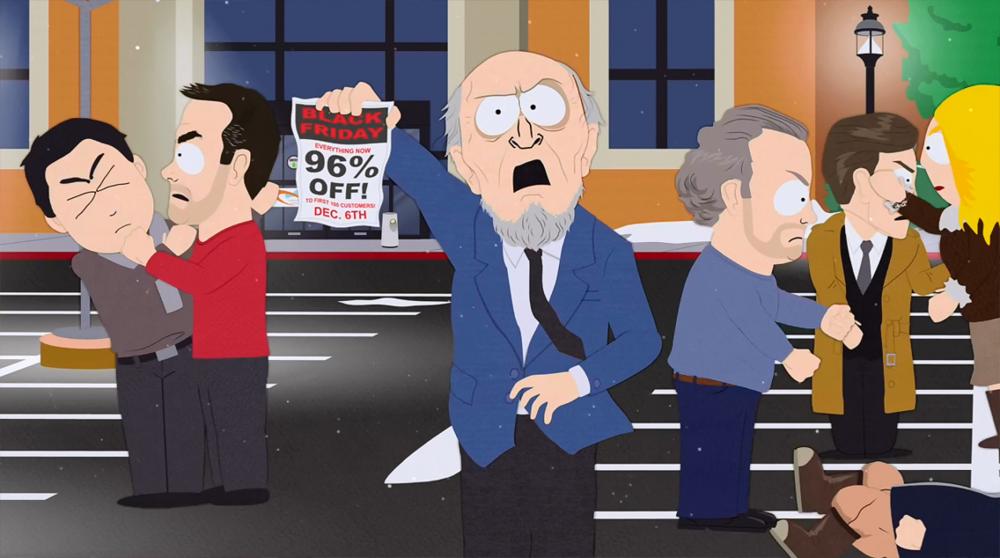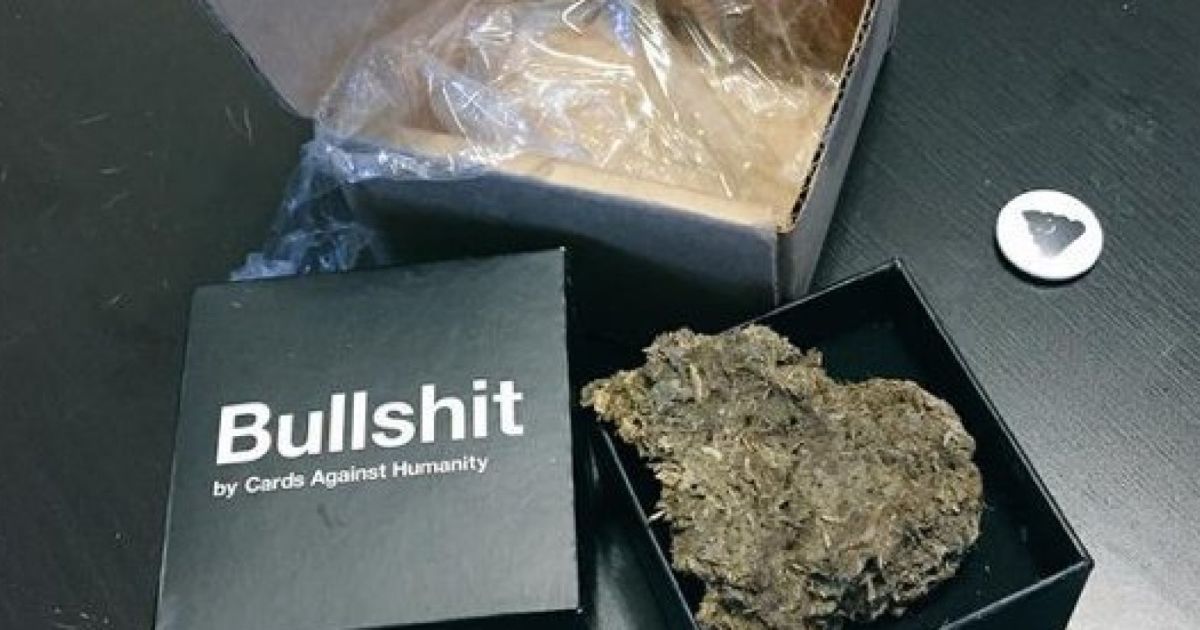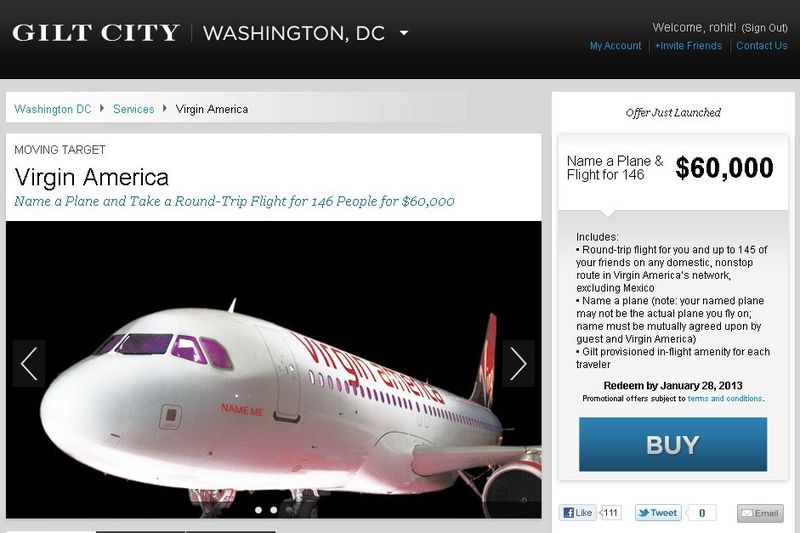Black Friday in a new light: non-standard strategies from global brands
Say quickly and without thinking: what comes to mind when you hear the words "Black Friday?" Almost everyone now, probably, thought about discounts, benefits, cheapness, large purchases, sales, and so on. But I think that many people also remembered the annual video gathering with scuffles and thefts from carts, exposing fake shares, headlines in the spirit of “The guard at Walmart crushed to death” and other bacchanalia.
In recent years, Western corporations have a problem: the second row of associations gradually begins to score the first.

Like that
')
In the broad masses, a restrained and in some places a negative attitude towards Black Friday is taking shape. Discussions in social networks are already in a more minor tone: to replace the hectic revival began to come irritation, disgust, fear and apathy. As polls show , more than half of buyers doubt that they get the maximum benefit from shopping on that day, and 79% do not enjoy it. Of course, this does not mean that people abruptly stopped paying money, but, as companies continue to generously contribute to the organization of November sales, the enthusiasm of the audience is gradually fading .
Some corporations, it seems, have already noticed where the wind is blowing, and began to adapt their approach to changing moods. In this article, I would like to talk about strategies that have begun to gain popularity recently, and bring cases from those who tried to move away from Black Friday in its classic version.
Black Friday is canceled.
According to the latest reports, already more than 75% of corporations are preparing for Black Friday and other derivative special offers with all sorts of discounts and bonuses. Accordingly, anyone who abstains from participation is automatically in the minority - and this is an occasion to attract attention to oneself. Of course, just silently withdrawing from universal insanity is not enough for this: knowledgeable people are boycotting purposefully and under a certain slogan.
One of the loudest cases with such an approach is the experience of REI, a manufacturer of clothing and equipment for outdoor enthusiasts. In 2015, the administration announced that on Black Friday (as well as the previous Thanksgiving Day) the entire chain of stores would be closed. Cause? The company encourages people to spend time on the air, and not in the flea market at the box office. For the sake of this good goal, she not only refuses to jump in revenue, but also incurs additional costs to give all employees a paid holiday.
The noble impulse paid off : the #OptOutside movement received more than a million positive responses in social networks, and traffic on the site (where, of course, you can also place orders) per day X jumped 26%, although the announcement was made in a few weeks. Some corporations (for example, Outdoor Research) openly expressed their support for the idea, others silently adopted it, in order to repeat it in 2016.

REI is closed. Let's go outside.
The success of REI was explained not only by the fact that the idea was new, and the moment was chosen successfully, but also by good execution: the initiative fitted the brand image well, the message was positive, and instead of shopping and saving people were offered a clear and interesting alternative: to join the “movement », Share stories and photos, feel active and free.
Followers repeat their experience with varying success. The ASDA supermarket chain last year, for example, answered customers' questions about the planned “black” promotions, with a funny video. The thirty-second video led the viewer through the store's halls with spaced installations of mannequins playing out the horrors typical of the holiday: vanity, skirmishes with guards, fights - and ended with the text: “Feel the atmosphere of Friday? Relax ... our prices are low any day. ” The press liked it, but buyers reacted to advertising without much interest, and the following year ASDA returned to the proven sales tactics.
Black friday vice versa
There is another option: to spend Black Friday in a more or less standard format, but dissociate itself from what causes customers negative, emphasizing their commitment to the opposite values. What repels us? Thirst for profit and thoughtless consumption. What can be considered the reverse of this? The expediency of spending and charity. It is on charity that many corporations are now focusing in their campaigns.
This method is convenient, not least because it allows you to sit on two chairs - and work on reputation and make a profit. There are, of course, examples like Patagonia, which gave the entire Friday proceeds to clean up the environment, but most of the players still show moderation. Braintree, for example, donates half, FatFace is limited to 10% .
There are also funny schemes that combine altruistic goals with quite traditional triggers (cheap! For free!). Suppose the Pieminister Black Pieday promotion is a bakery that, as you have probably suspected, specializes in pies. On Black Friday, they offer customers to donate money (any amount) in favor of the homeless and in return receive a gift in the form of branded cake. The stock of frozen pies was completely distributed in an hour, collecting about 2,000 pounds - I suppose, this speed was explained not only by the keen desire of buyers to do a good deed.
Black Friday with Blackjack
The trouble of Black Friday is not only in its lack of high spirituality, but also in some monotony. A week before the holiday from the endless red numbers, minuses and percent signs are already beginning to ruffle in the eyes. It is difficult to attract the user's attention precisely to their discount, when everyone has a discount (well, or 75%). Therefore, many people come to the idea of the need for some kind of bonus, something that will make the offer interesting not only in terms of price.

Typical special offer from Cards Against Humanity
The undisputed leader in creating creative concepts for Black Friday is Cards Against Humanity, which brought this approach to the level of avant-garde art. Using their reputation as an informal and freakish organization, they brought the postulate “on Black Friday, people heated by universal hysteria buy what they don’t need” to the point of absurdity - they sold manure and empty boxes, raised the price one and a half times, offered to donate absolutely senseless initiatives organized by the company . And each time it really brings them money - the audience is ready to pay for entertainment and satire on a painful topic. By the way, the company does not like to repeat itself and this year changed its course to a more political one , without changing the corporate style.
If we take examples more modestly, the network of stores with Lowe's home goods last year, having noticed the popularity of livestream on Facebook, began to build its campaign on Black Friday in the format of a live show. For several weeks, a group was created in which live broadcasts were laid out with the announcement of discounts and prize drawing; at the same time they were generously seasoned with interactive games, tricks, performances of comedians and other circus fireworks. The first video teaser gathered an audience of almost half a million people - not bad for a company that sells tool kits and artificial Christmas trees.

Virgin America Hot Promotion Screenshot
Sometimes for a flash of interest there is enough one unexpected or unusual offer. Back in 2010, Virgin America, in partnership with Gilt City, invited its customers to fly to a charter flight of their choice “with 146 their own close friends” on a company plane for just $ 60,000 - and with a bonus opportunity to come up with a name for the flight . There were no people willing to pay such a sum, but there were enough people willing to discuss the action.
Black (any other day of the week)
Well, or not black - any other color will work, as well as adjectives like “civilized” or “cybernetic”. In recent years, an entire orbit of “subsidiary” commercial holidays and non-commercial initiatives began to gradually form around Black Friday, on which you can also earn money or the reputation of a “good guy” and which have not yet had time to acquire negative associations.
About Cyber Monday, the most senior and accustomed of them, probably, heard almost everything. Initially, it was a day when people could continue their holiday shopping in online stores from computers in offices, so as not to suffer from the slow and expensive home Internet. Now, of course, such a scheme has long become an anachronism, but the very tradition of setting aside a special day for stocks of online stores remains. Unlike Black Friday, which, according to many analysts, has already experienced the peak of popularity, Cyber Monday is still on the rise - it is not surprising, considering that it doesn’t sell goods on the Web right now only lazy.
Among the other, less well-known creations of Black Friday are: Generous Tuesday (the opportunity to atone for their capitalist sins with donations for those who did not do it directly on Friday), Small Business Saturday (the same Friday, only for small ones; remarkable for what causes wide the masses are rather positive feelings) and the Civilized Saturday (“the antithesis of Black Friday”, an initiative of a number of bookstores, where the most refined buyers can take a break from wasting money, plunge into quiet relax atmosphere for a book and a glass of wine ... and at the same time spend some more money).
In addition to individual events that complement the main or oppose themselves to him, we also more and more often see attempts to stretch Friday itself for longer . The extent of the extension varies: somewhere it is an unobtrusive gift to Friday buyers in the form of a good discount for the next day or an early start, and somewhere - we look at you, Amazon - a whole month of Fridays of all colors of the rainbow.
At first glance, this seems illogical: after all, the whole point of the idea is precisely to lure customers into extremely profitable, but at the same time extremely limited offers. Hypotheses regarding this trend can be put forward different. Someone may be trying to make sales growth less sharp. Someone is trying to reduce the load on human and technical resources that hardens for limiting values. Someone hopes to collect additional profits. And someone just dreams of a half-month holiday season without specifications and boundaries.
So, Black Friday continues to attract the masses and will be well for many more years. However, under the pressure of public opinion, companies with a more innovative spirit are beginning to gradually emerge in their interaction with the holiday on the meta level. Black Friday is increasingly becoming not a way to collect additional revenue, but as an excuse to promote the brand, make it talk about yourself. Popular are the initiatives “from the opposite”, which allow to stand out against the background of the consumer orgy, demonstrating other values. Probably, in the next years we will see not only endless “unique offers”, but also an increasing wave of creativity in attempts to benefit from the holiday in a roundabout way. And it pleases - for them, at least, more interesting to watch.
In recent years, Western corporations have a problem: the second row of associations gradually begins to score the first.

Like that
')
In the broad masses, a restrained and in some places a negative attitude towards Black Friday is taking shape. Discussions in social networks are already in a more minor tone: to replace the hectic revival began to come irritation, disgust, fear and apathy. As polls show , more than half of buyers doubt that they get the maximum benefit from shopping on that day, and 79% do not enjoy it. Of course, this does not mean that people abruptly stopped paying money, but, as companies continue to generously contribute to the organization of November sales, the enthusiasm of the audience is gradually fading .
Some corporations, it seems, have already noticed where the wind is blowing, and began to adapt their approach to changing moods. In this article, I would like to talk about strategies that have begun to gain popularity recently, and bring cases from those who tried to move away from Black Friday in its classic version.
Black Friday is canceled.
According to the latest reports, already more than 75% of corporations are preparing for Black Friday and other derivative special offers with all sorts of discounts and bonuses. Accordingly, anyone who abstains from participation is automatically in the minority - and this is an occasion to attract attention to oneself. Of course, just silently withdrawing from universal insanity is not enough for this: knowledgeable people are boycotting purposefully and under a certain slogan.
One of the loudest cases with such an approach is the experience of REI, a manufacturer of clothing and equipment for outdoor enthusiasts. In 2015, the administration announced that on Black Friday (as well as the previous Thanksgiving Day) the entire chain of stores would be closed. Cause? The company encourages people to spend time on the air, and not in the flea market at the box office. For the sake of this good goal, she not only refuses to jump in revenue, but also incurs additional costs to give all employees a paid holiday.
“Black Friday is the right time to remind yourself of an important truth: life becomes richer, fuller and less lonely when you spend it not in the four walls. We close the doors of the stores, pay our employees daily wages so that they can get out into the air, and we invite America to join us, because no matter how much we love good equipment, the experience to which it opens the way is even more expensive ”- press release REI
The noble impulse paid off : the #OptOutside movement received more than a million positive responses in social networks, and traffic on the site (where, of course, you can also place orders) per day X jumped 26%, although the announcement was made in a few weeks. Some corporations (for example, Outdoor Research) openly expressed their support for the idea, others silently adopted it, in order to repeat it in 2016.

REI is closed. Let's go outside.
The success of REI was explained not only by the fact that the idea was new, and the moment was chosen successfully, but also by good execution: the initiative fitted the brand image well, the message was positive, and instead of shopping and saving people were offered a clear and interesting alternative: to join the “movement », Share stories and photos, feel active and free.
Followers repeat their experience with varying success. The ASDA supermarket chain last year, for example, answered customers' questions about the planned “black” promotions, with a funny video. The thirty-second video led the viewer through the store's halls with spaced installations of mannequins playing out the horrors typical of the holiday: vanity, skirmishes with guards, fights - and ended with the text: “Feel the atmosphere of Friday? Relax ... our prices are low any day. ” The press liked it, but buyers reacted to advertising without much interest, and the following year ASDA returned to the proven sales tactics.
Black friday vice versa
There is another option: to spend Black Friday in a more or less standard format, but dissociate itself from what causes customers negative, emphasizing their commitment to the opposite values. What repels us? Thirst for profit and thoughtless consumption. What can be considered the reverse of this? The expediency of spending and charity. It is on charity that many corporations are now focusing in their campaigns.
This method is convenient, not least because it allows you to sit on two chairs - and work on reputation and make a profit. There are, of course, examples like Patagonia, which gave the entire Friday proceeds to clean up the environment, but most of the players still show moderation. Braintree, for example, donates half, FatFace is limited to 10% .
“We, as a company, have a difficult attitude towards Black Friday, but it’s impossible to pretend that it does not exist. This is the only way for us to participate without sacrificing our values, and a great opportunity to contribute to the solution of some serious problems. ”- John Snare, head of the London branch of Braintree
There are also funny schemes that combine altruistic goals with quite traditional triggers (cheap! For free!). Suppose the Pieminister Black Pieday promotion is a bakery that, as you have probably suspected, specializes in pies. On Black Friday, they offer customers to donate money (any amount) in favor of the homeless and in return receive a gift in the form of branded cake. The stock of frozen pies was completely distributed in an hour, collecting about 2,000 pounds - I suppose, this speed was explained not only by the keen desire of buyers to do a good deed.
Black Friday with Blackjack
The trouble of Black Friday is not only in its lack of high spirituality, but also in some monotony. A week before the holiday from the endless red numbers, minuses and percent signs are already beginning to ruffle in the eyes. It is difficult to attract the user's attention precisely to their discount, when everyone has a discount (well, or 75%). Therefore, many people come to the idea of the need for some kind of bonus, something that will make the offer interesting not only in terms of price.

Typical special offer from Cards Against Humanity
The undisputed leader in creating creative concepts for Black Friday is Cards Against Humanity, which brought this approach to the level of avant-garde art. Using their reputation as an informal and freakish organization, they brought the postulate “on Black Friday, people heated by universal hysteria buy what they don’t need” to the point of absurdity - they sold manure and empty boxes, raised the price one and a half times, offered to donate absolutely senseless initiatives organized by the company . And each time it really brings them money - the audience is ready to pay for entertainment and satire on a painful topic. By the way, the company does not like to repeat itself and this year changed its course to a more political one , without changing the corporate style.
If we take examples more modestly, the network of stores with Lowe's home goods last year, having noticed the popularity of livestream on Facebook, began to build its campaign on Black Friday in the format of a live show. For several weeks, a group was created in which live broadcasts were laid out with the announcement of discounts and prize drawing; at the same time they were generously seasoned with interactive games, tricks, performances of comedians and other circus fireworks. The first video teaser gathered an audience of almost half a million people - not bad for a company that sells tool kits and artificial Christmas trees.

Virgin America Hot Promotion Screenshot
Sometimes for a flash of interest there is enough one unexpected or unusual offer. Back in 2010, Virgin America, in partnership with Gilt City, invited its customers to fly to a charter flight of their choice “with 146 their own close friends” on a company plane for just $ 60,000 - and with a bonus opportunity to come up with a name for the flight . There were no people willing to pay such a sum, but there were enough people willing to discuss the action.
Black (any other day of the week)
Well, or not black - any other color will work, as well as adjectives like “civilized” or “cybernetic”. In recent years, an entire orbit of “subsidiary” commercial holidays and non-commercial initiatives began to gradually form around Black Friday, on which you can also earn money or the reputation of a “good guy” and which have not yet had time to acquire negative associations.
About Cyber Monday, the most senior and accustomed of them, probably, heard almost everything. Initially, it was a day when people could continue their holiday shopping in online stores from computers in offices, so as not to suffer from the slow and expensive home Internet. Now, of course, such a scheme has long become an anachronism, but the very tradition of setting aside a special day for stocks of online stores remains. Unlike Black Friday, which, according to many analysts, has already experienced the peak of popularity, Cyber Monday is still on the rise - it is not surprising, considering that it doesn’t sell goods on the Web right now only lazy.
Among the other, less well-known creations of Black Friday are: Generous Tuesday (the opportunity to atone for their capitalist sins with donations for those who did not do it directly on Friday), Small Business Saturday (the same Friday, only for small ones; remarkable for what causes wide the masses are rather positive feelings) and the Civilized Saturday (“the antithesis of Black Friday”, an initiative of a number of bookstores, where the most refined buyers can take a break from wasting money, plunge into quiet relax atmosphere for a book and a glass of wine ... and at the same time spend some more money).
In addition to individual events that complement the main or oppose themselves to him, we also more and more often see attempts to stretch Friday itself for longer . The extent of the extension varies: somewhere it is an unobtrusive gift to Friday buyers in the form of a good discount for the next day or an early start, and somewhere - we look at you, Amazon - a whole month of Fridays of all colors of the rainbow.
At first glance, this seems illogical: after all, the whole point of the idea is precisely to lure customers into extremely profitable, but at the same time extremely limited offers. Hypotheses regarding this trend can be put forward different. Someone may be trying to make sales growth less sharp. Someone is trying to reduce the load on human and technical resources that hardens for limiting values. Someone hopes to collect additional profits. And someone just dreams of a half-month holiday season without specifications and boundaries.
So, Black Friday continues to attract the masses and will be well for many more years. However, under the pressure of public opinion, companies with a more innovative spirit are beginning to gradually emerge in their interaction with the holiday on the meta level. Black Friday is increasingly becoming not a way to collect additional revenue, but as an excuse to promote the brand, make it talk about yourself. Popular are the initiatives “from the opposite”, which allow to stand out against the background of the consumer orgy, demonstrating other values. Probably, in the next years we will see not only endless “unique offers”, but also an increasing wave of creativity in attempts to benefit from the holiday in a roundabout way. And it pleases - for them, at least, more interesting to watch.
Source: https://habr.com/ru/post/343088/
All Articles